
Red ants, or fire ants as they're also known, can rapidly grow or relocate their colonies, swarm and sting when disturbed and are commonly found in warmer regions of the US.
Getting rid of them should be a priority, and the key, our pest control pros tell us, is to make sure you kill the queen, otherwise no matter how many visible red ants you wipe out, the queen will replenish her colony and you'll be back on the fire ant merry-go-round within weeks. It is particularly effective to tackle red ants in the spring and fall.
We spoke to pest control pros for a comprehensive guide on red ant behavior, what they forage, why and where they set up colonies indoor and out, and 12 brilliant ways to get rid of ants in your home and yard for good.
What you need to know about killing red ants
If you find red ants in your kitchen or elsewhere, work quickly to locate their indoor nests and eliminate them using insecticide-laden bait, or be willing to call in exterminators as their colony will only grow.
If red ants are outside your home, perhaps their mounds are visible in your lawn or there is a flurry of activity in the far reaches of your yard around a rotten log, keep a close eye if you do not wish to tackle them straight away. They may not be bad for your garden but pose a risk to you.
If you don't tackle the problem, even if the red ants seem far from your property, these smart ants will swarm aggressively if disturbed, perhaps by a pet or a child and their sting not only hurts, but can be cause a serious allergic reaction called anaphylaxis (where the airways swell or close) in up to 16 per cent of people.
Additionally, when ants run out of food or water, they're quick to set up satellite colonies – it can happen in a matter of hours – as they spread out on the hunt for what they need to survive and keep their queen healthy and reproducing.
Their nests and colonies are connected by tunnels underground so do not be lulled into a false sense of security just because the mounds you've spotted feel far enough away from your home.
Where do red ants set up their colonies outdoors?
Outdoors, fire ants like sunny areas of your lawn or land, rotting wood, trees and stumps, as well as sometimes setting up home in your exterior masonry, wood work, inside electrical or other utility boxes, as well as cracks in concrete or under decks.
Their mounds look like little mountains of fresh, fluffy dirt and you will likely be able to spot the creatures themselves scurrying around foraging for food and water.
You can identify pests such as red ants by their reddish-brown bodies and darker heads. They may also appear slightly larger than your regular black ant.
Where do red ants setup their colonies indoors
Drawn indoors by flooding of their colony, a lack of resources, hot, wet, or dry weather, or food (they like greasy, fat-heavy, or sugar-laden finds) ants are smart, relentless, opportunistic, as well as hardened survivors.
If you spot red ants inside your home, chances are, they've set up a colony already, or are exploring the potential for one indoors, having been drawn in by water, food or adverse weather.
They might be colonizing an area under fixtures such as bathtubs (bear in mind most ant species need water for their nests), warmer areas such as where your water heater is housed, or in voids such as the eaves of your home, attic, or foundations.
The key to killing red ants
Wipe out the visible ants all you want, but unless your method of eradication kills the queen, she'll be safely tucked away inside her nest, being fed and watered by the remaining worker ants and reproducing at an alarming rate. It takes around two weeks from her laying an egg to it hatching and joining the workforce.
Tackling infestations in the spring and fall are particularly good times but any time of year you spot them, get moving quick to rid your home or yard of red ants.
How to kill red ants in your yard
Getting rid of red ants in your yard is easier than clearing an infestation that has entered your home, however, it should still be done with caution.
Angering red ants could lead to a painful sting, so ensure you take the proper precautions when dealing with these fiery bugs. Wearing full-arm gloves, such as these waterproof, cotton-lined Haiou gloves, from Amazon to reduce of harsh ant stings getting through to your skin.
Here are the various methods available to you:
1. Broadcast vs mound treatment
Broadcast bait insecticide treatment is low-effort, more effective and will stay effective for longer as it means spreading your insecticide widely over an area, for example your entire lawn.
This means both the fire ants you can and cannot see will take the bait back to their colony and it'll end up targeting the queen. If you only treat the mounds, you'll end up with one mound wiped out but the smaller, less visible ones still in play.
2. Use boiling water and soap
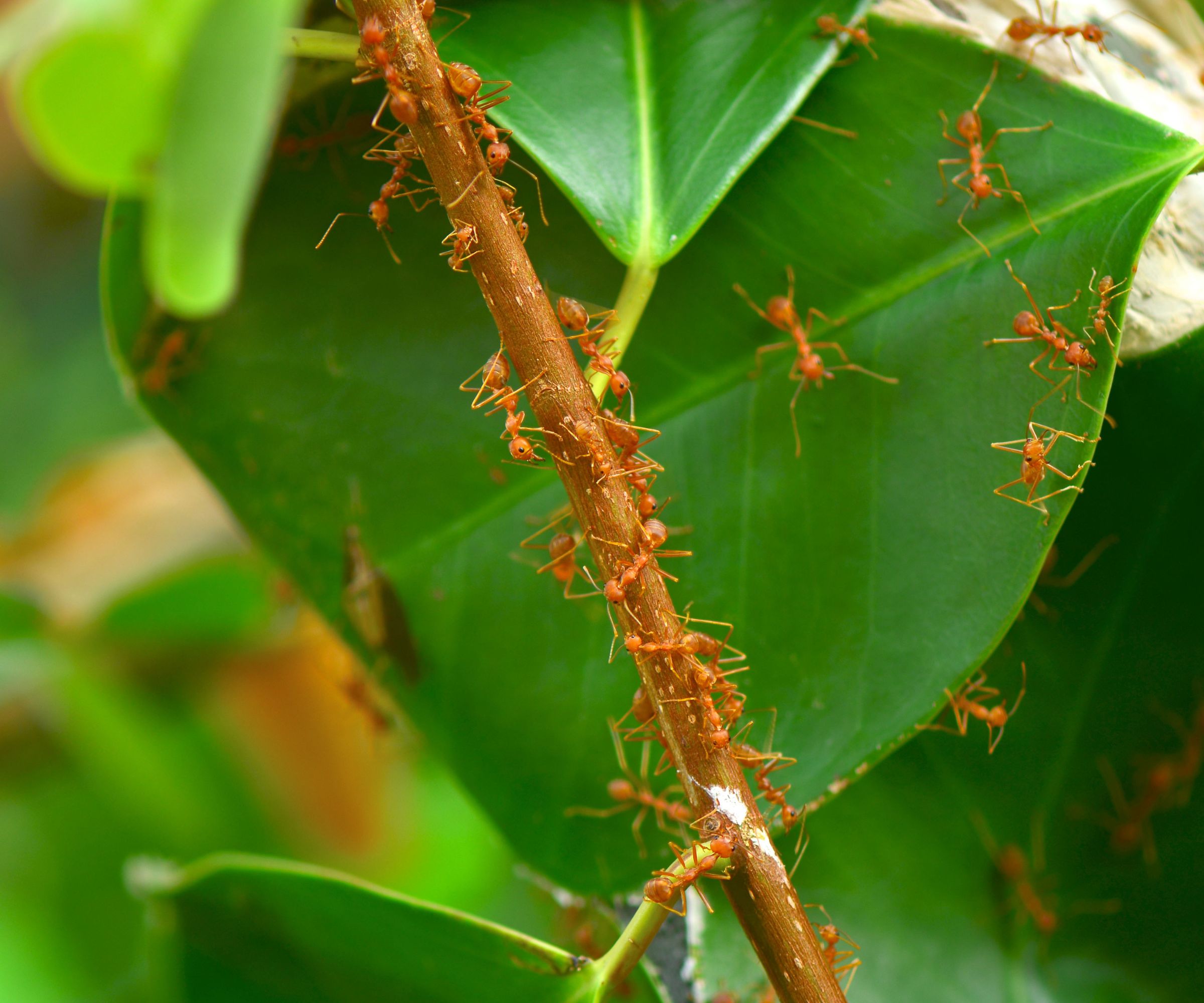
One of the most effective ways of killing red ants instantly is to flush them out with boiling water and soap. The soap breaks down the waxy coating on the ants while the hot water dehydrates them.
This method can be done both in and outside due to the lack of chemicals, but if you are using it outside, avoid pouring it on plants you don't want to kill – this approach is best for targeting ant mounds or nests.
To do this, Jeremy Yamaguchi, CEO of Lawn Love says, 'Mix three parts boiling water to one part dish soap. Rake the top of the mound away to expose the primary tunnel system, then use a funnel to pour the boiling water mixture right into the heart of the nest.'
It is best to pour water down as many entrances as you can find for the best results. You may need to repeat this multiple times to remove all of the ants, but it can work against all ant varieties including when getting rid of sugar ants.
When using the 'drench method', first use a stick or rod to press down into the center of the mound as far as you can, to pierce through all the layers of the nest before pouring your mix otherwise the queen may be safely tucked away out of reach and your problem returns.
This may cause the ants to swarm or sting so dress appropriately, and get out of there quick.
3. Insect growth regulator
Add insect growth regular such as Amazon's Choice product from Martin's to your arsenal so not only are you killing fire ants, but stopping the red ants from being able to reproduce. This will help get your infestation under control and stop you spinning your wheels repeating the process every couple of weeks.
4. Try white vinegar
White vinegar is another common household product that can be used to kill a range of insects and bugs. Much like using boiling water and soap, pour white vinegar, around one liter, directly into the nest to kill red ants.
White vinegar is perhaps a safer option than boiling water as it is not harmful to your plants or the ground despite being able to kill red ants on contact. Boiling water, on the other hand, although effective, could scorch your plants or their roots.
This is most effective when paired with broadcast insecticide to tackle other nests in the area.
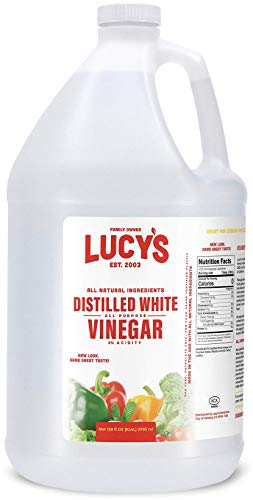
This 1 gallon bottle is perfect for the job and if you have anything leftover, use it in a 50/50 ratior with water for cleaning around the home with vinegar.
5. Combine boric acid and sugar
A targeted baiting system combined with a time-release pesticide is super effective. This method involves using a substance the ants find attractive to encourage them to bring it back to the colony, which is laced with an insecticide that kills them off.
One way to do make an effective mix yourself is with boric acid and sugar.
'Boric acid is one of the most effective methods for killing red ants and getting rid of crickets and other pests in your home,' says Rachel Bull, head of gardens for Homes & Gardens. 'Mixing it with sugar creates an irresistible paste for red ants who will carry the mixture back to the nest and queen. Once ingested, the ants will die, allowing this method to wipe out large colonies quickly and prevent new ones being created by the queen.'
Mix boric acid with sugar bit by bit until it forms a thick paste before placing small amounts of the paste around ant colony entrances. This strategy addresses immediate issues while planning for long-term prevention, ensuring minimal disruption to your yard.
You can also buy pre-loaded bait stations such as the Savitri Ant Gel Bait, available from Amazon which uses ingredients often used by professional pest controllers. It's an effective and highly-rated red ant bait you can use inside and outside.
6. Lay out diatomaceous earth
Diatomaceous earth is a naturally occurring material that works excellently for killing ants without harsh chemicals, ideal for both out and indoor use. This silica is a non-poisonous way kill red ants over larger areas of your yard and is not damaging to plant life.
Spreading this gritty powder traps ants and acts as a natural abrasive that kills ants by dehydrating them. You can either use this directly on the ants or sprinkle some around the perimeter you're trying to protect, such as near entry points and structures like decks and patios.
As this powder is an irritant, make sure to avoid breathing the powder in or getting it on your skin by wearing a mask and gloves as you apply it. Once spread, keep pets and your children away from the area.
The drawback with this substance is that it will kill red ants before they can take it back to their queen, so the queen is unlikely to be killed if you solely rely on diatomaceous earth when killing red ants in your home or yard. First hit the infestation with bait stations to allow the poison to be delivered to the queen, then use this to control the visible ones.
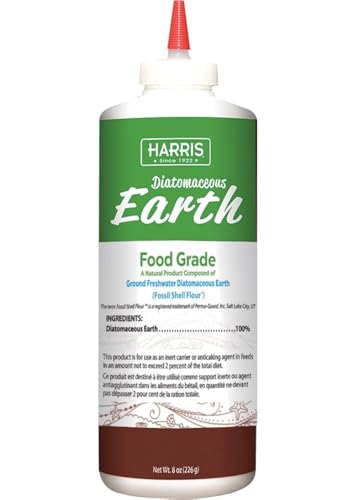
We love the easy application puffer tip of this food-grade product which will stop you using too much and repelling the red ants, instead of letting them get close enough to be covered in it and be exterminated.
7. Plant insect repellent plants
Prevention is also key when you're dealing with pests long-term. Red ants have a strong sense of smell and there are many smells that ants hate that will help to dissuade them from setting up home in your yard.
'Plants such as mint, chili plants, basil, lavender, and eucalyptus can all help to deter ants,' says Rachel Bull, H&G gardens editor. 'You may also want to try spraying citrus or garlic scents around your yard as these are natural ant repellents too.'
You can use an essential oils set, from Amazon, to make a homemade spray. Use 20-30 drops to two cups of water, shake to mix then spray. It is worth noting the smell will fade and need frequent reapplication.
How to kill red ants in your home
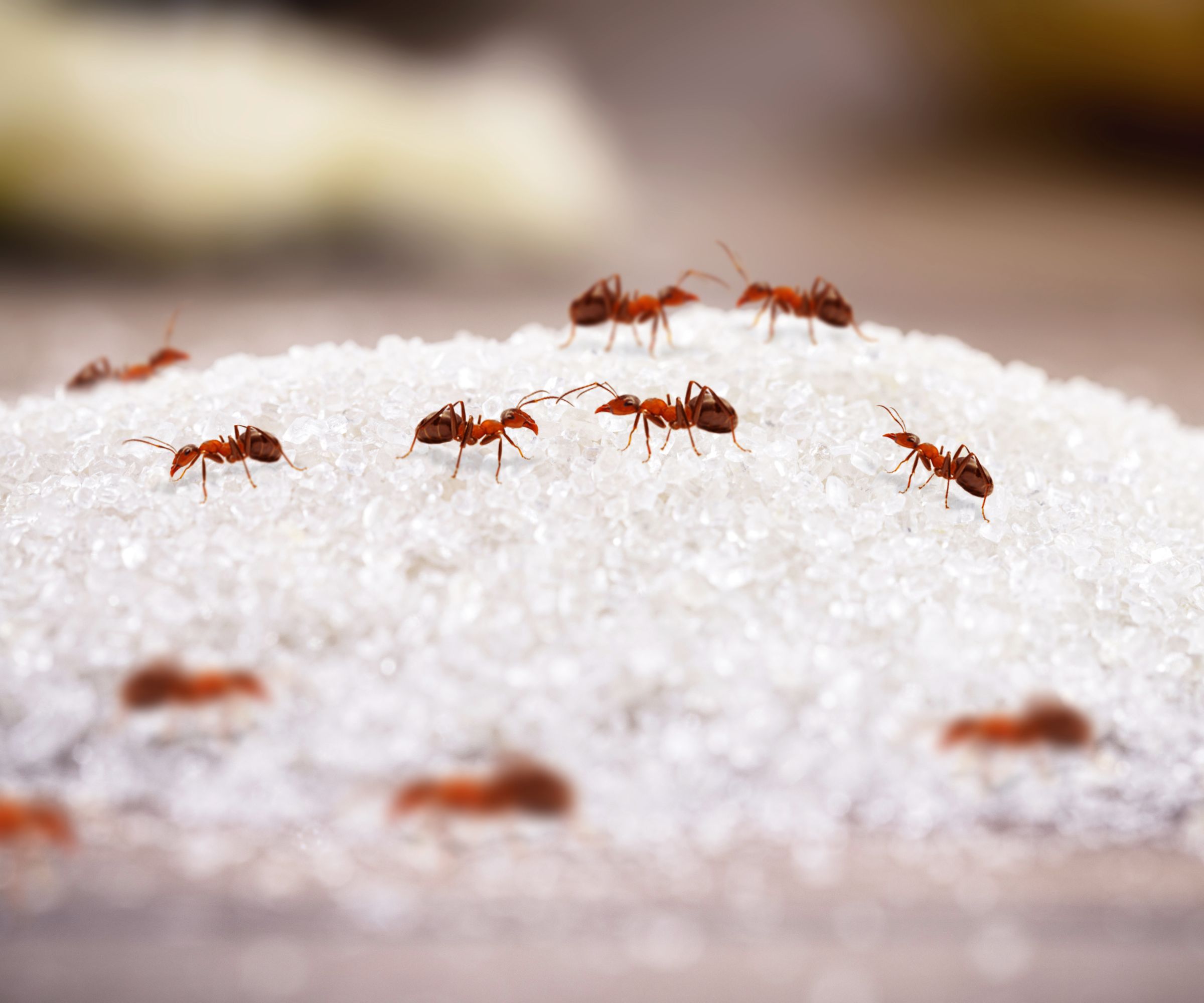
Killing red ants in your home can prove more difficult with the need to preserve your furniture and appliances. Luckily, there are a few easy methods that can help to kill red ants naturally that you can try before it's time to call professional pest controllers in.
1. Sprinkle cornstarch
Cornstarch is available at grocery stores, making it easily accessible and often cheap, such as Argo cornstarch at Walmart.
If you have visible red ants crawling around your home, sprinkle the powder over the ants to smother them from a distance. Once they have ceased crawling, simply use your vacuum to clean the ants and the cornstarch away.
Remember to remove, tightly seal your vacuum bag in a plastic trash bag and dispose of as well as use a vinegar spray to wipe out their chemical trails. Forgetting to clean them will mean other ants in their colony will traipse inside following their former colony-mate's scent trail.
Additionally, you can lightly mist the ants with water once they start to pick up the cornstarch to create a cement-like material that will quickly trap and kill the ants.
2. Make a natural pesticide with neem oil
'Neem oil is a gardener's best friend,' says Rachel. 'This simple oil is a great natural pesticide that can be used to combat a range of pests including ants and red ants while protecting your best indoor plants and furnishings.
'When using neem oil, you can dilute it into a spray with water to make a homemade bug spray by mixing one to two tablespoons of pure, cold-pressed neem oil, at Walmart, with a gallon of water. You can also add one to two teaspoons of dish soap to the mix to help the neem oil adhere to the plants. Although, full-strength neem oil will work the best against red ants.'
3. Use baking soda and sugar
If you do not want to put boric acid around your home, using baking soda to kill ants can be an effective alternative. Mix equal parts baking soda and powdered sugar and place the mixture around your home, where you know the red ants are frequently active.
Red ants have an insatiable sweet tooth that you can use against them. Like the outside boric acid and sugar paste, the red ants will be attracted to the sweet smell, taking the powder back to their colony to ingest. The baits allow the ants to take the slow-acting poison back to the colony and wipe out the queen and her brood, which is the golden rule for effective red ant wipeouts.
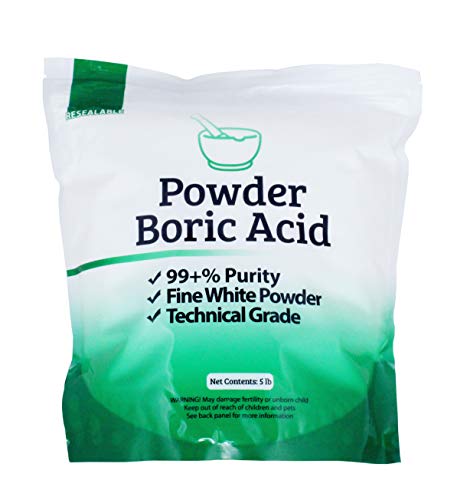
This will do the job nicely and can easily be resealed after use. Keep out of reach of pets and children.
4. Consider commercial repellents
If homemade or natural repellents have not worked to get rid of or kill red ants, consider using a commercially made repellent or bug spray to remove your ant problem. There are many non-toxic chemical sprays available such as Raid on Amazon.
Head of solved at Homes & Gardens, Punteha van Terheyden says that's her favorite ant killer. 'I've used it in different homes with great affect. It lasts about four weeks so you do have to reapply if you see ants return inside your home. I've not had to use it more than twice in one spot however.'
These sprays can be dangerous for use in homes with small children, people with breathing difficulties such as asthma, or pets so should be used with caution and according to the product instructions to avoid any adverse health symptoms.
'Combining insecticidal baits with contact insecticide sprays or dusts is my preferred one-two-punch approach,' says Jeremy Yamaguchi. 'At the same time as using a bait and pesticide approach, you can also hit ants with a fast-acting surface spray to take out the scouts and foragers on the spot. It's a coordinated strike from multiple angles.'
5. Call an exterminator
'Red ants can be a very difficult infestation to manage on your own, as they can withstand a lot of DIY approaches and simply move to another location, as they move so much, it can be hard to get them all,' warns Brett Bennett, director of operations, PURCOR Pest.
For persistent or large-scale problems, or if ants are causing damage to electrical appliances, it may be time to call a professional who can offer more specialized interventions, possibly including chemical treatments that are carefully applied to minimize damage to your property and health risks to inhabitants. They will also give you tailored pointers to prevent an infestation in the future.
If your red ant infestation is causing you stress and you cannot wait for DIY products to work, there is no shame in calling in professionals who have access to very strong insecticides.
FAQs
How to know if you have a red ant infestation
A red ant infestation presents itself the same as a regular ant infestation does in your home. The most obvious sign of red ants, however, is seeing the bright-bodied bugs in or around your home. 'If the ants are outside of your home, it may be easy to brush them off as just passing by but pay attention to their direction of travel,' advises Rachel. 'If they are walking in a line towards your home or up your walls, these ants may be living inside your property.'
Outside of your home, you may notice small mounds of soil which may be the opening of an ants nest. Observe the hole closely for ant activity but avoid disturbing it to prevent angering these stinging pests.
'Red ants may also feed on your houseplants, so damage to leaves or stems, particularly young plants, could also be a sign of an infestation if other common houseplant pests are ruled out,' Rachel continues. 'What's more, these ants are known to chew on electrical wiring insulation, possibly causing damage to your electronics and home utilities. Any electrical malfunctioning could be a sign that the red ant infestation is securely established, and a professional should be called.'
You may be able to hear ants that are living inside your internal walls, if you put your ear next to the wall and listen carefully. Small rustling sounds are an indicator that ants are traveling around your home internally or even living there, and are more typically an indicator of carpenter ants or termites.
Red ants particularly like voids where they will not be disturbed, and areas with heat sources, especially during the colder winter months.
How to prevent red ants
Much like why ants come into the house, red ants enter a home in search of basic necessities and often do not mean to be there. To prevent red ants, therefore, you should look to remove food, seal up cracks, gaps and any gaps they can enter through to dissuade them from setting up a home in your house. A waterproof, shrink proof sealant is ideal, such as the GE silicone sealant available on Amazon also being sun and freeze proof.
Make sure you store food in airtight containers, dispose of food waste properly, and clean up spillages straight away. Using clever cleaning tips will help you to stay on top of household cleaning to prevent insect infestations. You should also avoid leaving dishes in the sink or on the counter overnight where possible.
To prevent ants from being able to enter in the first place it is recommended that you seal any cracks or holes around your property – much like getting rid of water bugs – as well as sealing any gaps around windows, doors, vents, and eaves. Use a water and crack-proof sealant such as Gorilla sealant, available from Amazon.
Consider using a screen on open doors and windows in the summer to prevent insects such as red ants from entering easily. You can install ones that stick on with a special Velcro adhesive so no drilling is required, such as the Amazon bestselling Mdavo mesh screen.
Remove easy shelters such as firewood stored on the ground, remove tree stumps, and regularly tidy up and clean your garden ideas to remove debris that could provide ideal shelter from the elements for red ants.
Finally, simple things like keeping your yard free of debris that could harbor ants, and trimming back plants away from your foundation will make your home a lot less appealing to them in the first place.
Routine cleaning, basic maintenance, and minimizing attractions for the ants will serve you well.
Do red ants bite?
While red ants do not bite, they can deliver a painful sting if disturbed. These stings can cause a burning feeling, welts that itch or even blisters. These stings, although uncomfortable, can usually be treat with antihistamines and sting creams at home.
If you are allergic to fire ant stings they may cause more serious effects, however, and it is advised to seek emergency care if you have any signs of a serious or even life-threatening reaction such as mouth swelling or difficulty breathing.
What are the potential risks or hazards associated with using chemical insecticides to control red ant populations?
'The best way to avoid any potential risks or hazards associated with any chemical insecticide is to follow the directions on the label,' says Josh Malik, pest expert with Joshua Tree Experts. 'Using more products is not always better. All marketed products are regulated for safety by the EPA. That is deemed safe if labeled directions are followed. Too much of anything can be unsafe depending on the situation.
'Also keep in mind, off-target treatments may harm beneficial insects and plants even with natural methods such as the vinegar and water treatment. It can cause plant tissue damage and could be harmful to bees as well as other beneficial insects.'
Remember, if your issues with red ants persist, repeated treatment might be necessary depending on the scale of infestation. When in doubt, consult professional pest control services.
Next, delve into natural pest control methods.







